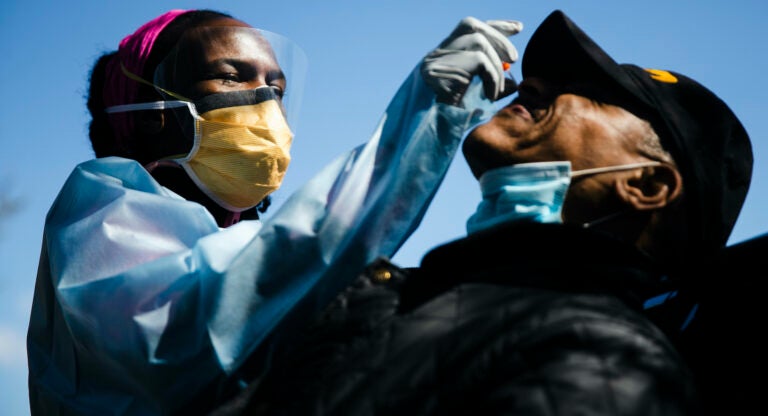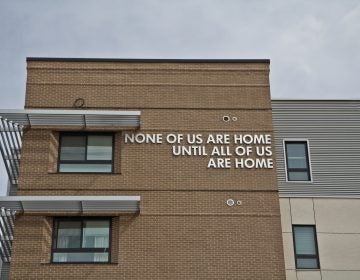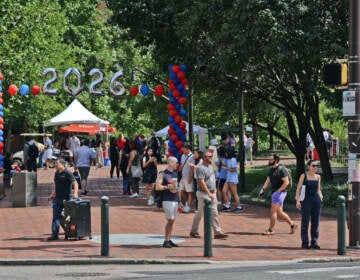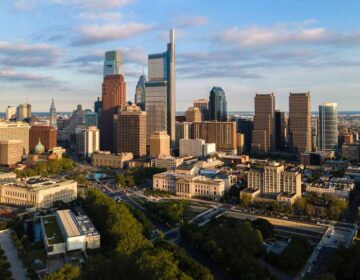Black doctors are providing free COVID-19 testing. Council wants to know why the city isn’t funding them.
Mayor Jim Kenney’s administration has come under fire for failing to support more Black-led organizations in the battle against the coronavirus.

Dr. Ala Stanford administers a COVID-19 swab test on Wade Jeffries in the parking lot of Pinn Memorial Baptist Church in Philadelphia, Wednesday, April 22, 2020. Stanford and other doctors formed the Black Doctors COVID-19 Consortium to offer testing and help address heath disparities in the African American community. (AP Photo/Matt Rourke)
Are you on the front lines of the coronavirus? Help us report on the pandemic.
Mayor Jim Kenney’s administration has come under fire for failing to support more Black-led organizations in the battle against the coronavirus.
One such group, the all-volunteer Black Doctors COVID-19 Consortium, which garnered national attention for operating mobile testing sites in underserved communities, held a press event at Salem Baptist Church on Thursday to draw attention to the city’s failure to fund the group’s operations.
Helmed by local surgeon Dr. Ala Stanford, the group has administered 5,000 tests to date, powered by unpaid doctors, nurses and medical staff, private donations, and a limited amount of federal CARES Act funding. It submitted a bid to the city for $6.9 million in funding for testing from the Centers for Disease Control and Prevention to expand their operations and perform contact tracing but was outbid by a chain of urgent care clinics.
Pastor Marshall Mitchell, speaking on Dr. Stanford’s behalf, said the group was best positioned to “cross cultural lines” and boost testing rates for a virus that has hit African Americans harder than other groups.
“The Black Doctors Consortium is the most trusted medical voice in the city among the people disproportionately dying of the disease,” Mitchell said. “The city, state, and federal government needs to be stepping up.”
‘Racial equity lens’ challenged
The lack of public investment in the organization has reopened a larger conflict between some City Council members and the mayor.
In budget hearings Wednesday, council members blasted the Kenney administration for passing over the Black Doctors COVID-19 Consortium bid. One day later, Councilmember María Quiñones-Sánchez accused the Kenney administration of failing to live up to its own promises to use a “racial equity lens” in budgeting and contracting decisions.
“We have vendors in the medical field that provide cultural competency, language access, all the things we say are important in reaching the people that are being impacted the most,” she said. “I’m tired of us saying one thing and doing something else.”
She said the issue also reflected the city’s longer-term failure to cultivate an effective minority contracting system. The majority of city contracts have historically gone to businesses owned by white men. For instance, in the 2019 fiscal year, business enterprises run by people of color won 36% of contract dollars, amounting to roughly $254 million, according to a 2019 report by the city’s Office of Economic Opportunity.
It marked the first time the Kenney administration met a goal of awarding 35% of contracts to businesses owned by people who identify as non-white, female or as someone with a disability, according to the report. But council members say more progress is needed.
Councilmember Cherelle Parker, a nominal ally of Kenney’s, said the underrepresentation of Black-led initiatives could harm public health, contributing to flagging testing rates in parts of the city that have a predominately African American population.
“The most valuable key or tool in contract tracing an individual…is strong interpersonal skills and the ability to relate to the community they’re testing,” Parker said. She said that bringing in “an African American owned and operated entity” to provide health care services during the pandemic should have been a “no-brainer.”
City officials said Thursday that the administration is legally bound by competitive bidding and procurement rules. Philadelphia’s Managing Director Brian Abernathy said the city had done its best to respond expediently in light of the sudden and ever-shifting demands of the pandemic.
“We all agree with council’s desire to improve our minority contracting as it relates to COVID and we are probably in a place now where we can make some of those improvements,” Abernathy said. “But Monday morning quarterbacking isn’t helpful.”
Abernathy said that the city had engaged a minority-owned property management firm for a COVID prevention site and that much earlier contracting focused on acquiring difficult-to-replicate personal protective equipment as quickly as possible.
“We didn’t have the luxury of waiting for another firm,” he said, of earlier spending decisions.

Subscribe to PlanPhilly
The city has since received a $92 million, five-year CDC grant for COVID-19 response efforts. Although the city has moved to amend two existing contracts –– with the Public Health Management Corporation and the Philadelphia Mental Health Care Corporation –– to benefit from the CDC grant without a bid, federal guidelines otherwise require any new contracts be put through a competitive process.
Quiñones-Sánchez suggested the city could alternatively use another $85 million of local funds to establish new contracts with smaller vendors owned by people of color. But Abernathy said the city hoped to ultimately be reimbursed by the federal government for these expenses as well, which would also necessitate competitive bidding.
“The idea that I can hand $10 million to one organization because we appreciate their work is farcical,” he said.
The Kenney administration’s position leaves groups like the Black Doctors COVID-19 Consortium without much hope of landing public funds to expand their operations in time to meet the pandemic’s needs. Mitchell described the group’s challenge in unflinching terms.
“I think it would be unwise and almost immoral that the one group that sacrificed itself, the one group that raised money to provide for people that the city and state were apparently not interested in testing, would now be looked over,” he said.
Mitchell said, for now, the group would largely carry on with unpaid staff and charitable donations while continuing to seek more dedicated funding.
“These are old church ladies bringing us crumbled five dollar bills. Working people who set aside a thousand dollars to support us,” he said. “But we will continue to test as long as Dr. Stanford and the other doctors are healthy enough to do it.”
 WHYY is one of over 20 news organizations producing Broke in Philly, a collaborative reporting project on solutions to poverty and the city’s push towards economic justice. Follow us at @BrokeInPhilly.
WHYY is one of over 20 news organizations producing Broke in Philly, a collaborative reporting project on solutions to poverty and the city’s push towards economic justice. Follow us at @BrokeInPhilly.
WHYY is your source for fact-based, in-depth journalism and information. As a nonprofit organization, we rely on financial support from readers like you. Please give today.






![CoronavirusPandemic_1024x512[1]](https://whyy.org/wp-content/uploads/2020/03/CoronavirusPandemic_1024x5121-300x150.jpg)



